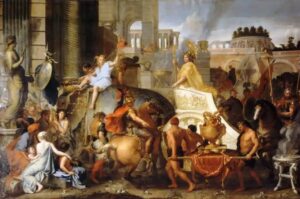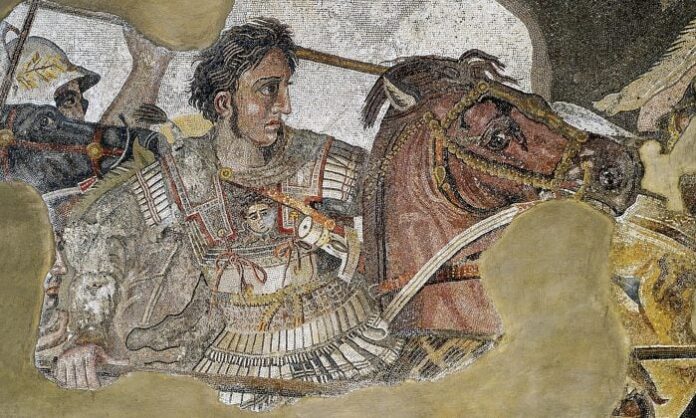The Untold Conspiracy: Unravelling Alexander the great’s assassination, lost tomb
For over two millennia, the death of Alexander the Great has remained one of the most debated and mysterious events in history. While historians have long speculated about his demise, new revelations suggest a sinister plot, entangled in greed, betrayal, and political ambition. As the quest for his final resting place intensifies, archaeologists and historians are uncovering disturbing truths that challenge the traditional narrative surrounding the legendary Macedonian king.
Alexander the Great: Warrior, Philosopher, and Visionary
Alexander the Great, revered as one of the most formidable military commanders in history, was more than just a conqueror. According to newly discovered historical records, he was a reformer, philosopher, and visionary who dreamed of a world united under one law—a world of peace and harmony, free from endless wars. This revolutionary idea made him not only a threat to his enemies but also to his own generals, who ultimately plotted his downfall.
The Hidden Conspiracy: Assassination, Not Disease
Contrary to popular belief, Alexander did not succumb to a disease. Babylonian cuneiform tablets, unearthed by archaeologists, reveal that no illness struck the city or its Greek inhabitants during Alexander’s final days. The once widely accepted theory of his death from malaria or pancreatic cancer now seems unlikely. Instead, historians suggest that Alexander was poisoned—a fate eerily similar to that of his childhood friend, Hephaestion, and his spiritual advisor, Kalanos.
The motive? A conspiracy rooted in corruption and power struggles. General Antipatros, accused of embezzlement by Alexander, was at the center of the plot. His sons, along with the banquet master Medios of Thessaly, served poisoned wine to Alexander at a royal feast. Tragically, the only physician capable of saving Alexander’s life mysteriously disappeared the night of the banquet. The aftermath saw soldiers revolt and the Babylonian governor suppressing the unrest, all to maintain the treacherous coup d’état.
A Body That Defied Time and Corruption
In death, Alexander’s body became as legendary as his life. Unlike ordinary men, his corpse did not decompose, fueling speculation and myth around his divine status. Ptolemy I, one of Alexander’s closest companions and future ruler of Egypt, kidnapped the body, diverting it from its intended burial in Macedonia to Alexandria, Egypt. There, Alexander was enshrined as a god, his sarcophagus moved several times over centuries.
Cleopatra, Julius Caesar, and other rulers would visit his tomb, paying homage to the great warrior. But as centuries passed, his resting place disappeared from history. A tsunami in 365 AD destroyed much of Alexandria, leading to the eventual sealing and hiding of Alexander’s tomb by devoted priests.


The Rediscovery: Clues to the Lost Tomb
Despite countless attempts, Alexander’s tomb remains elusive, hidden in the shadows of history. However, recent discoveries suggest that the tomb may still lie beneath the city of Alexandria. A French diplomat in 1898 claimed to have stumbled upon the ancient sarcophagus in the ruins of a consulate basement, only to be silenced by his untimely murder.
Modern investigations, led by historian and writer Alexandre Schoedler-Tziamouranis, have reignited the search. His meticulous research over 20 years has traced the movement of Alexander’s body through nine relocations, culminating in a quest for the final resting place beneath a private residential building in Alexandria. However, legal and political barriers continue to obstruct the excavation.
The Legacy of Alexander: A New Chapter in History
As new evidence emerges, the history of Alexander the Great is being rewritten. The sensational discoveries not only reshape our understanding of his death but also bring us closer to unearthing his lost tomb—a discovery that would rewrite the history books and reignite global fascination with the world’s most famous conqueror.
While the mystery of Alexander the Great’s tomb remains unsolved, the legacy of his life and the conspiracy that ended it continue to captivate historians, archaeologists, and treasure hunters alike.
Will the truth of his death and the location of his final resting place ever be uncovered? The search continues…
Follow the Neptune Prime channel on WhatsApp:
Do you have breaking news, interview request, opinion, suggestion, or want your event covered? Email us at neptuneprime2233@gmail.com














